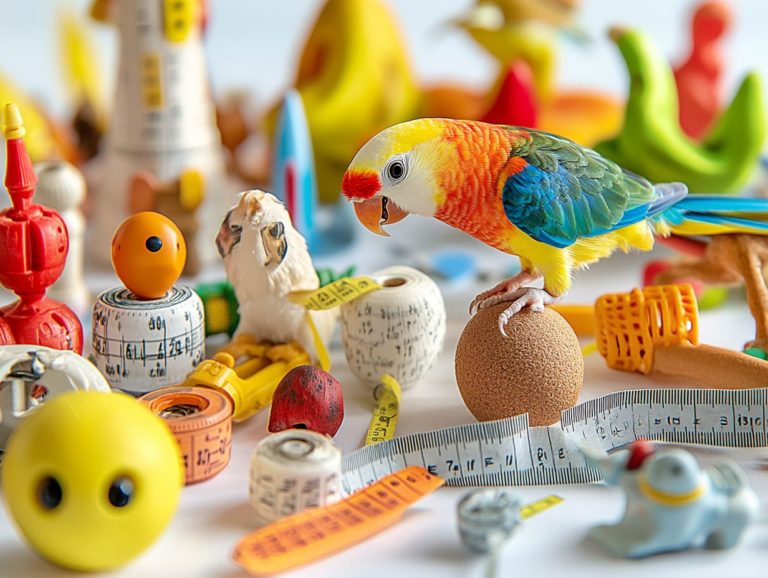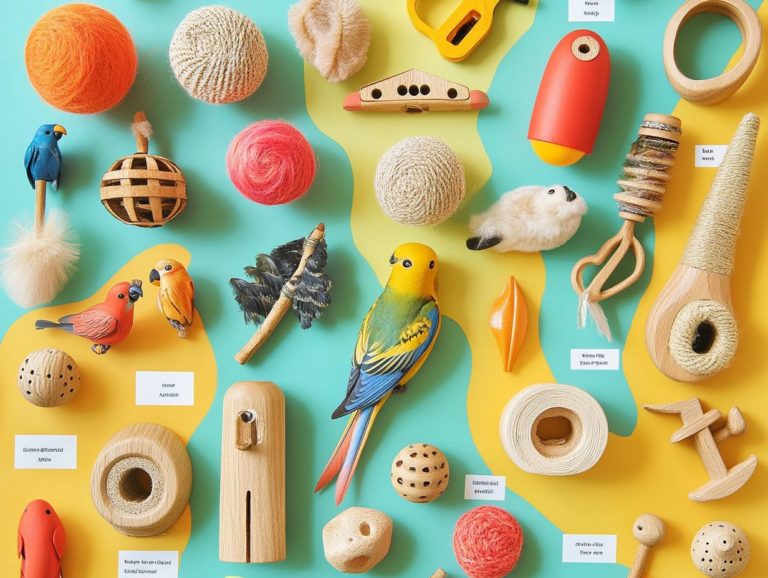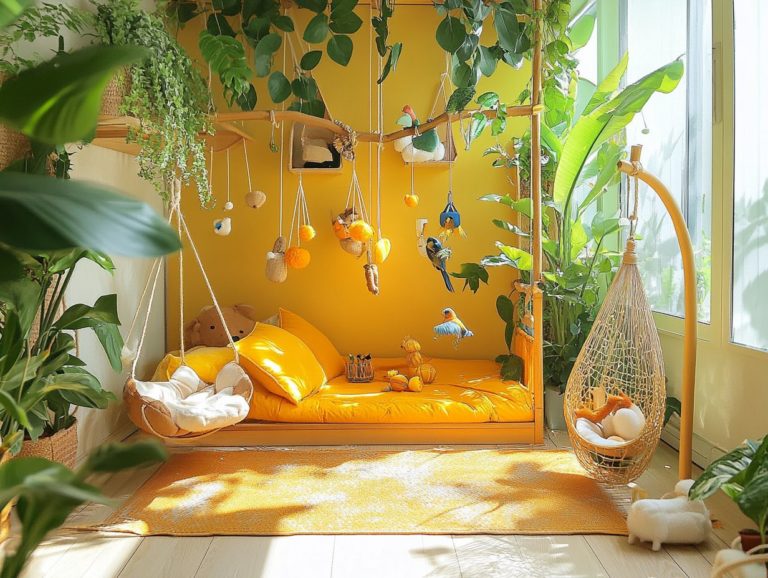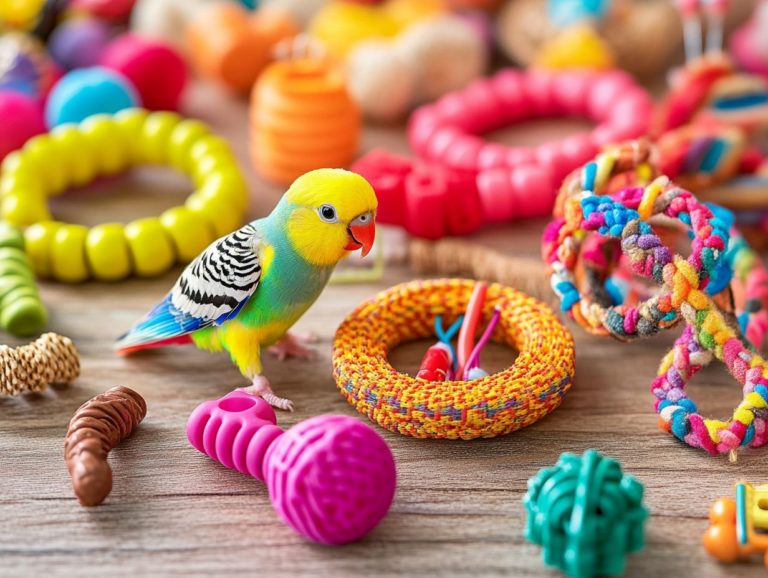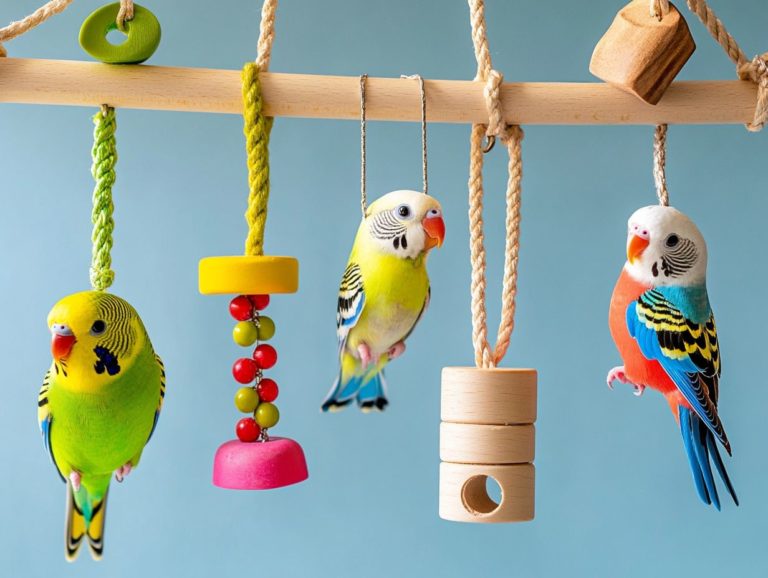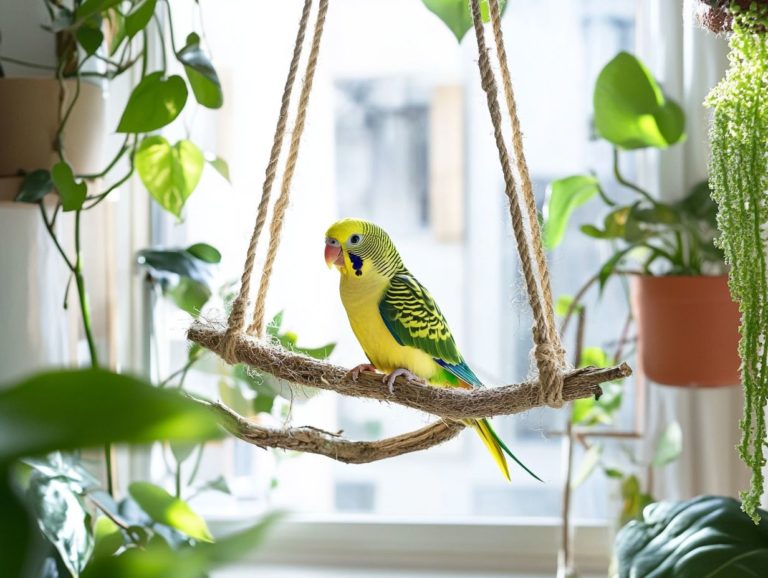Top 6 Bird Accessories for Indoor Birds
Creating a cozy and enriching environment for your indoor bird is essential for their happiness and well-being.
This piece delves into the top six accessories that can truly elevate your feathered friend s space. From selecting the perfect cage or aviary to choosing engaging toys, ensuring proper food and water setups, and recognizing the importance of baths and minerals, there s a wealth of factors to consider.
Uncover valuable tips, avoid common pitfalls, and explore fun DIY options to transform your bird’s home into a truly special sanctuary. Whether you re a seasoned bird owner or just beginning your journey, these insights will guide you in crafting the ideal haven for your pet.
Contents
- Key Takeaways:
- 3. Food and Water Bowls
- 4. Bird Bath
- 5. Cuttlebone
- 6. Mineral Blocks
- How to Choose the Right Accessories for Your Indoor Bird?
- What Are the Different Types of Cages or Aviaries Available?
- What Types of Toys Are Best for Indoor Birds?
- How to Properly Set Up Food and Water Bowls for Indoor Birds?
- Why Is a Bird Bath Important for Indoor Birds?
- What Are the Benefits of Cuttlebone for Indoor Birds?
- Why Do Indoor Birds Need Mineral Blocks?
- What Are Some Common Mistakes to Avoid When Choosing Bird Accessories?
- How Can Bird Accessories Help with the Health and Well-Being of Indoor Birds?
- What Are Some DIY Options for Bird Accessories?
- Frequently Asked Questions
- What are the top 6 must-have accessories for indoor birds?
- Why is a spacious cage important for indoor birds?
- What types of perches are best for indoor birds?
- How often should I change out my bird’s toys?
- Do I need to provide a bird bath for my indoor bird?
- Why is it important to cover the cage at night?
Key Takeaways:
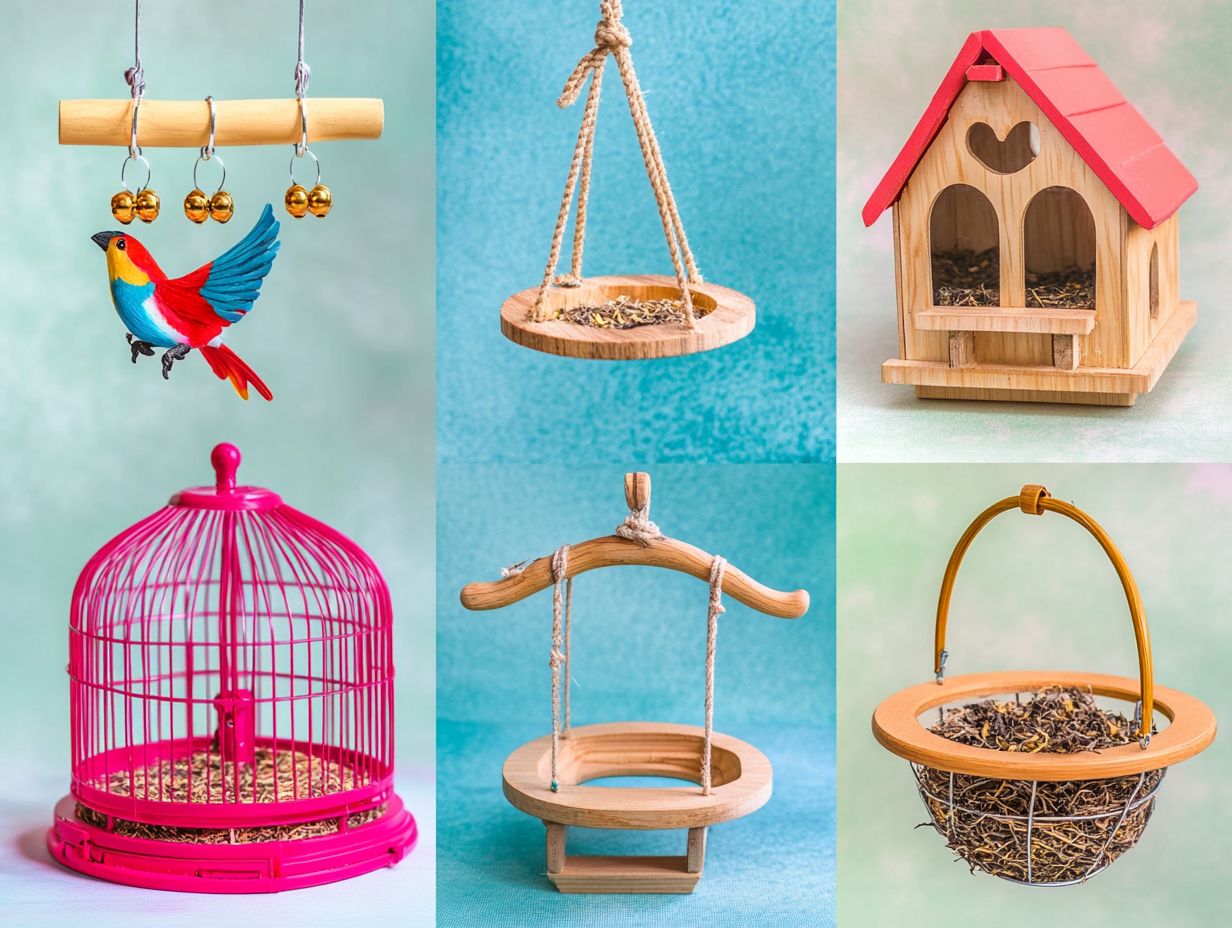
- Indoor birds need a cage or aviary for their safety and comfort. Choose a cage or aviary that is spacious enough for your bird to move around and has proper ventilation.
- Perches and toys are essential for your indoor bird’s physical and mental stimulation. Provide a variety of perches and safe, bird-friendly toys to keep your bird entertained.
- Proper food and water bowls are necessary for your indoor bird’s health. Choose shallow bowls for food and deep bowls for water, and clean them regularly to prevent bacterial growth.
1. Cage or Aviary
Choosing the ideal habitat for your feathered friend is important, as it profoundly impacts their health, behavior, and overall happiness. A carefully selected cage provides your pet bird with ample space for movement, play, and rest, which is essential for helping your bird sleep well and reducing stress in birds.
When selecting a cage or aviary, consider factors such as the size of your bird and their social tendencies. Incorporating accessories like comfortable perches and safe toys can significantly enhance their comfort and happiness.
Understanding the differences between cages and aviaries is key; aviaries typically offer a larger space that allows birds to fly and play freely, closely resembling their natural habitat. It s crucial to take into account the specific needs of the bird species; some may thrive in a snug cage, while others need the spaciousness of an aviary.
Enriching the habitat with stimulating accessories, such as climbing structures and interactive toys, can enhance your bird’s activity and mental health. Veterinarian recommendations often emphasize that a well-structured living environment is vital for maintaining a bird’s health and happiness, reinforcing the idea that a thoughtfully crafted home leads to a happier, healthier pet.
2. Perches and Toys
Providing the right perches and toys for your pet bird is crucial for their physical and mental stimulation. These accessories foster healthy behaviors and help reduce avian anxiety. Comfortable perches tailored to your bird’s size and needs allow them to rest well and move naturally.
Engaging bird toys not only encourage playfulness but also promote their thinking skills. By incorporating a variety of safe toys and specialized heating perches, you enhance their environment, nurturing their social nature and helping them become happier, more well-adjusted companions.
Different types of perches, especially those made from natural wood, mimic their natural habitats and offer the texture and grip necessary for promoting foot health. Heated perches are great during colder months, ensuring your bird s comfort.
Regularly rotating toys and perches is key to preventing boredom, which can lead to stress or undesirable behaviors. This dynamic approach to their living environment contributes significantly to their well-being, encouraging exploratory play and mental engagement essential elements for overall avian wellness.
By focusing on these components, you can create a thriving habitat that nurtures both the physical and emotional well-being of your feathered friends.
3. Food and Water Bowls
Choosing the right food and water bowls is crucial for your bird’s health. Make sure the bowls fit your bird’s needs and help them access fresh food easily.
Consider the design and size of the bowls to suit your bird. Smaller birds, like parakeets, may need shallower bowls, while larger birds, such as parrots, require deeper ones.
Keeping the bowls clean is very important. Regularly replacing food and water prevents contamination and keeps your bird healthy. Rinse bowls daily and choose dishwasher-safe options to make cleaning easy.
This dedication to their dining area promotes good eating habits and leads to a happier, healthier bird.
4. Bird Bath
A bird bath is more than just a luxury; it s essential for your pet bird’s health and hygiene. Regular bathing helps keep their feathers clean, which is necessary for insulation and waterproofing.
When setting up a bird bath, use a shallow and stable container to prevent drowning. Place it in a quiet, shaded spot to help your bird feel relaxed.
Use a gentle, bird-safe cleaning solution to maintain hygiene without harming their delicate skin. Regular maintenance, including routine water changes, creates a healthy environment that encourages natural grooming.
This engagement not only aids in feather maintenance but also boosts your bird’s emotional well-being, contributing to a happy and vibrant pet.
5. Cuttlebone
Cuttlebone is an essential dietary supplement for your pet birds, providing crucial calcium and aiding digestion two vital aspects of their care.
This natural source of calcium helps prevent health issues, especially in breeding and aging birds. By adding cuttlebone to their space, you meet their nutritional needs and offer them a fun activity.
For bird species like parrots, canaries, and finches, give cuttlebone in small pieces or hang it as a chewable treat. A small piece should be available at all times, supporting their instinct to peck and chew, which also helps maintain their beaks.
Beyond calcium, cuttlebone prevents deficiencies that could lead to serious health issues, ensuring your birds lead happy and healthy lives.
6. Mineral Blocks
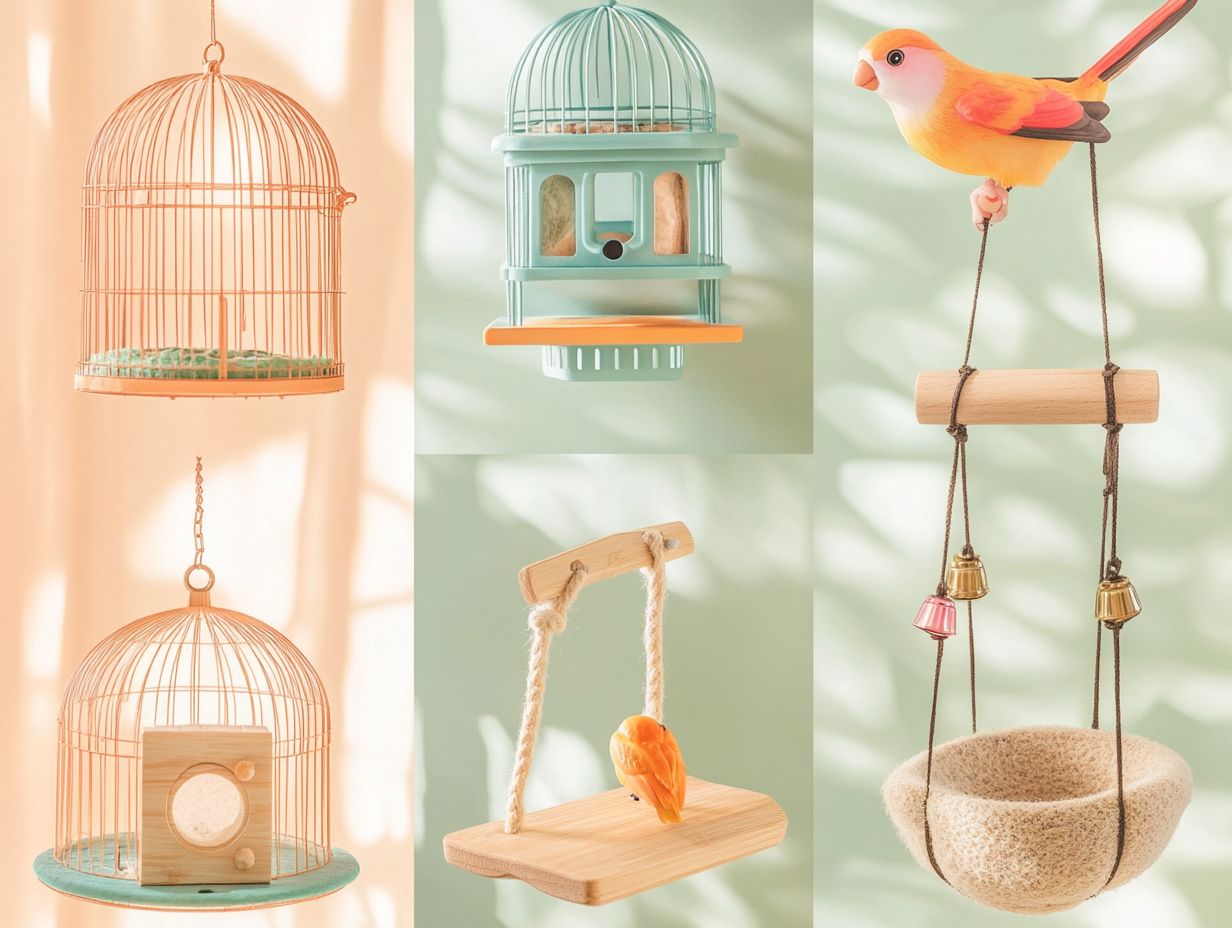
Mineral blocks are essential dietary supplements. They enhance your pet birds’ overall wellness by supplying crucial minerals missing from their diets.
These blocks support functions like feather development and bone health. This ensures your feathered friend remains a vibrant and healthy companion.
Make feeding time exciting by adding mineral blocks! They elevate your birds’ nutritional intake and are vital for their feeding regimen.
Rich in essential minerals like calcium, magnesium, and phosphorus, these blocks play an important part in various bird diets. Parrots need extra calcium for strong bones and healthy egg production, while canaries require specific minerals to maintain their dazzling colors.
To integrate mineral blocks into their diet, offer them alongside a balanced mix of seeds, fruits, and vegetables. This approach guarantees a diverse and nutritious diet, significantly impacting their long-term health.
How to Choose the Right Accessories for Your Indoor Bird?
Choosing the right accessories involves careful consideration of factors that ensure your bird’s health, comfort, and well-being. Accessories like safe toys, appropriate perches, and quality food and water bowls are essential.
Use veterinary recommendations and behavioral insights to create an enriching environment. This encourages social interaction and mental stimulation, leading to a happier, healthier pet.
When selecting accessories, evaluate their size. This ensures they fit perfectly in your bird’s space, allowing for free movement without overcrowding.
Choose non-toxic and durable materials to prevent health issues. Observe how your bird interacts with their accessories for insights into their preferences and comfort levels.
Stay attentive to your pet’s behavior, and consult with veterinary professionals for the safest choices.
What Are the Different Types of Cages or Aviaries Available?
When selecting a living space for your pet bird, you’ll find a variety of cages and aviaries. Each type meets the specific needs of different species.
Consider spacious aviaries that promote flight and social interaction, or smaller cages that provide cozy containment. Understanding your bird’s unique needs is key.
The size of the cage matters; larger aviaries benefit more active species, significantly enhancing their quality of life. Materials are equally important; for example, stainless steel is durable and rust-resistant, suitable for both indoor and outdoor settings.
Think about cage design; vertical spaces for climbing or platforms for resting can cater to specific needs. Ensure safety features like non-toxic finishes and secure locks are in place to protect your bird.
Evaluate your pet s habits and preferences when choosing the right setup. This ensures a comfortable, secure home for your feathered friend.
What Types of Toys Are Best for Indoor Birds?
Selecting the best toys for your indoor birds is essential for providing them with mental stimulation and promoting positive behaviors. These factors are crucial for their overall wellness.
Birds are naturally curious and smart. Supplying a variety of safe toys encourages play, fulfilling their need for social interaction and exploration.
Incorporating toys that challenge their minds and mimic their natural instincts can effectively prevent boredom and minimize the chances of behavior problems.
For example, consider foraging toys. These toys hide treats and encourage your bird to search for them, mimicking their natural hunting behavior. Interactive toys that require problem-solving skills keep them engaged and mentally agile.
Natural wooden toys offer a safe chewing option while replicating the environment many species thrive in.
By thoughtfully integrating these diverse types of toys into their habitat, you can significantly enhance your birds’ emotional well-being, resulting in happier and healthier companions overall!
How to Properly Set Up Food and Water Bowls for Indoor Birds?
Setting up food and water bowls properly for your indoor birds is essential for ensuring they have access to fresh food and hydration. Both are fundamental to their nutrition.
Consider the placement and design of the bowls carefully to promote cleanliness and ease of access while minimizing waste.
Following your veterinarian’s advice on a proper diet can significantly enhance your birds health, encouraging a balanced intake of essential nutrients.
Different bird species have varying requirements for bowl size and type. Smaller birds like finches may need shallow dishes to prevent drowning, while larger parrots thrive with deeper bowls that accommodate their beak size.
Placing the bowls at a comfortable height ideally at eye level encourages natural foraging behaviors and reduces the risk of contamination.
Cleaning regularly is crucial; using bird-safe disinfectants helps eliminate any food remnants that might harbor harmful bacteria. This keeps their water clean and their food fresh, ultimately supporting the overall well-being of your feathered companions.
Why Is a Bird Bath Important for Indoor Birds?
A bird bath is essential for maintaining the hygiene and feather health of your indoor birds. It promotes their overall wellness and comfort.
By providing a designated space for bathing, you encourage natural behaviors that help keep their feathers and skin clean. This is crucial for thermoregulation and comfort.
Ensuring that the bird bath is easily accessible and consistently clean can prevent common issues associated with dirty feathers. This ultimately supports your feathered friends’ health and happiness.
Regular bathing boosts their physical well-being and enriches their behavioral patterns, offering mental stimulation that alleviates boredom.
When choosing a bird bath, consider its size and depth to ensure it meets the needs of the specific species you have.
Maintaining the cleanliness of the bath is equally important; using mild, bird-safe cleaning solutions creates a healthy environment while avoiding harsh chemicals.
This encourages frequent bathing, ensuring that feathers remain pristine and your birds stay content. Ultimately, this fosters a vibrant and lively atmosphere in their living space!
What Are the Benefits of Cuttlebone for Indoor Birds?
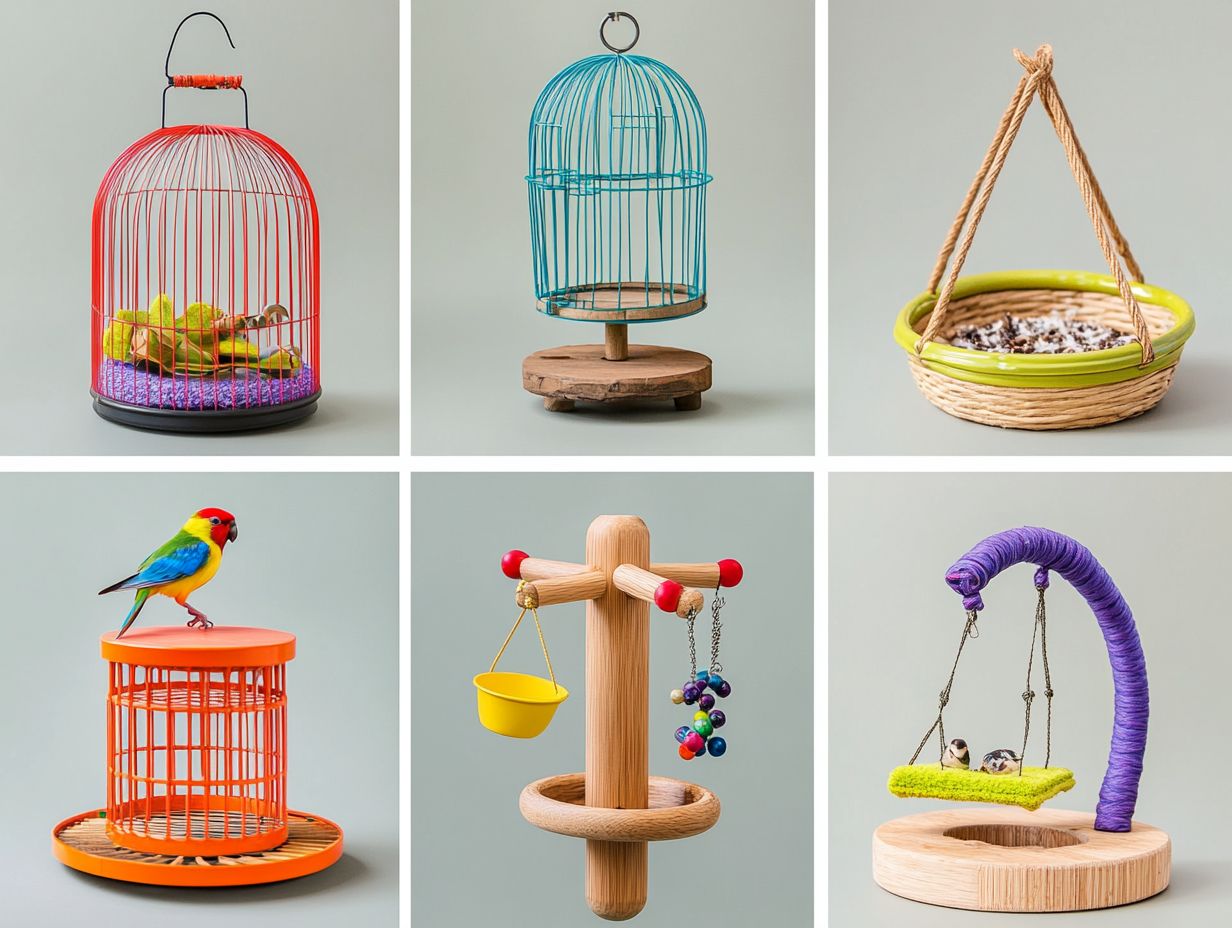
Cuttlebone offers numerous benefits for your indoor birds. It primarily serves as a dietary supplement, delivering essential calcium that supports overall health.
This natural source of calcium is crucial for bone development and feather quality. It s especially important for growing or breeding birds.
By providing cuttlebone regularly, you help your feathered friend meet their nutritional needs. This promotes their long-term well-being.
Introducing cuttlebone into their diet is vital for maximizing its benefits. Present it in small pieces that your bird can easily nibble on.
Some birds may embrace it immediately, while others might need a little encouragement. Try mixing it with their favorite seeds or soft food.
For larger birds like cockatoos and macaws, offering whole pieces works well. Smaller species like budgies or finches prefer smaller, crumbly portions.
Keep the cuttlebone fresh and clean to maintain their interest. This ensures optimal nutrient absorption.
Why Do Indoor Birds Need Mineral Blocks?
Mineral blocks are essential for indoor birds. They provide critical minerals that support overall health and nutritional needs.
These blocks play a key role in body functions, such as feather growth and bone health. This keeps your pet bird vibrant and thriving.
Incorporating mineral blocks into their diet helps prevent deficiencies. It also promotes a balanced intake of essential nutrients.
These blocks contain key minerals like calcium, phosphorus, and trace elements such as zinc and iodine. Calcium strengthens bones while phosphorus aids energy metabolism.
Trace minerals support enzyme function and immune health, contributing to your bird’s vitality. To introduce these blocks, place them near food and water sources for easy access.
Allow your bird to explore at its own pace. Observe their interest to manage their mineral intake and establish a beneficial routine.
What Are Some Common Mistakes to Avoid When Choosing Bird Accessories?
Choosing the right accessories for your pet bird is crucial. Avoid common mistakes to enhance their quality of life and health.
Many owners overlook safety, size, and suitability of accessories. This can lead to health issues or behavioral problems.
Be aware of pitfalls like unsafe toys or improper diets. Creating a happier and healthier environment for your bird starts with informed choices.
Research materials that are bird-safe. Ensure there are no harmful chemicals or sharp edges that could pose a risk.
The size of toys and perches is equally important. Accessories that are too big or too small can cause discomfort and injuries.
Consult a veterinarian for personalized recommendations. They can guide you on suitable materials and types of enrichment that promote healthy behaviors.
By carefully investigating each choice, you can significantly improve your pet s well-being and overall happiness.
How Can Bird Accessories Help with the Health and Well-Being of Indoor Birds?
Bird accessories are essential for the health and well-being of your indoor birds. They provide both physical and mental enrichment, significantly elevating their quality of life.
When you select the right accessories think safe toys, cozy perches, and suitable feeding solutions you meet your pet s behavioral needs and nutritional requirements. By thoughtfully incorporating a range of accessories, you create an engaging environment that nurtures both the mind and body of your feathered companion.
Offering a variety of toys that encourage hunting behavior can keep your bird mentally stimulated and help fend off boredom. Climbing ropes and swings promote essential physical activity.
Integrating natural branches as perches not only gives your bird a comfy resting spot but also mirrors their wild habitats, encouraging more natural behaviors. Using specialized feeders challenges your birds to work for their food, ensuring they receive balanced nutrition while sharpening their problem-solving skills.
By regularly rotating these accessories and introducing new ones, you can maintain their interest and promote ongoing physical and mental exploration in your avian friends.
What Are Some DIY Options for Bird Accessories?
Creating your own bird toys is not only fun but also saves money. You can provide your feathered friend with safe and engaging toys that cater to their environmental and nutritional needs.
Imagine crafting toys from natural materials or designing perches perfectly suited to your bird’s size; the possibilities are limitless. By dedicating time to these projects, you also unleash your creativity, fostering a happier and healthier bird.
These endeavors can strengthen the bond between you and your bird, as they allow for personalization based on your pet’s unique preferences and behaviors. Simple recipes for DIY bird toys can include materials like twine, paper, and wooden blocks, while feeding solutions could involve crafting toys that hide treats from food-safe materials.
However, it s essential to regularly monitor these accessories for wear and tear, ensuring they stay safe and engaging. Regular inspections of toys and feeding solutions not only enhance safety but also inspire new ideas that align with your bird’s evolving interests.
Frequently Asked Questions
What are the top 6 must-have accessories for indoor birds?
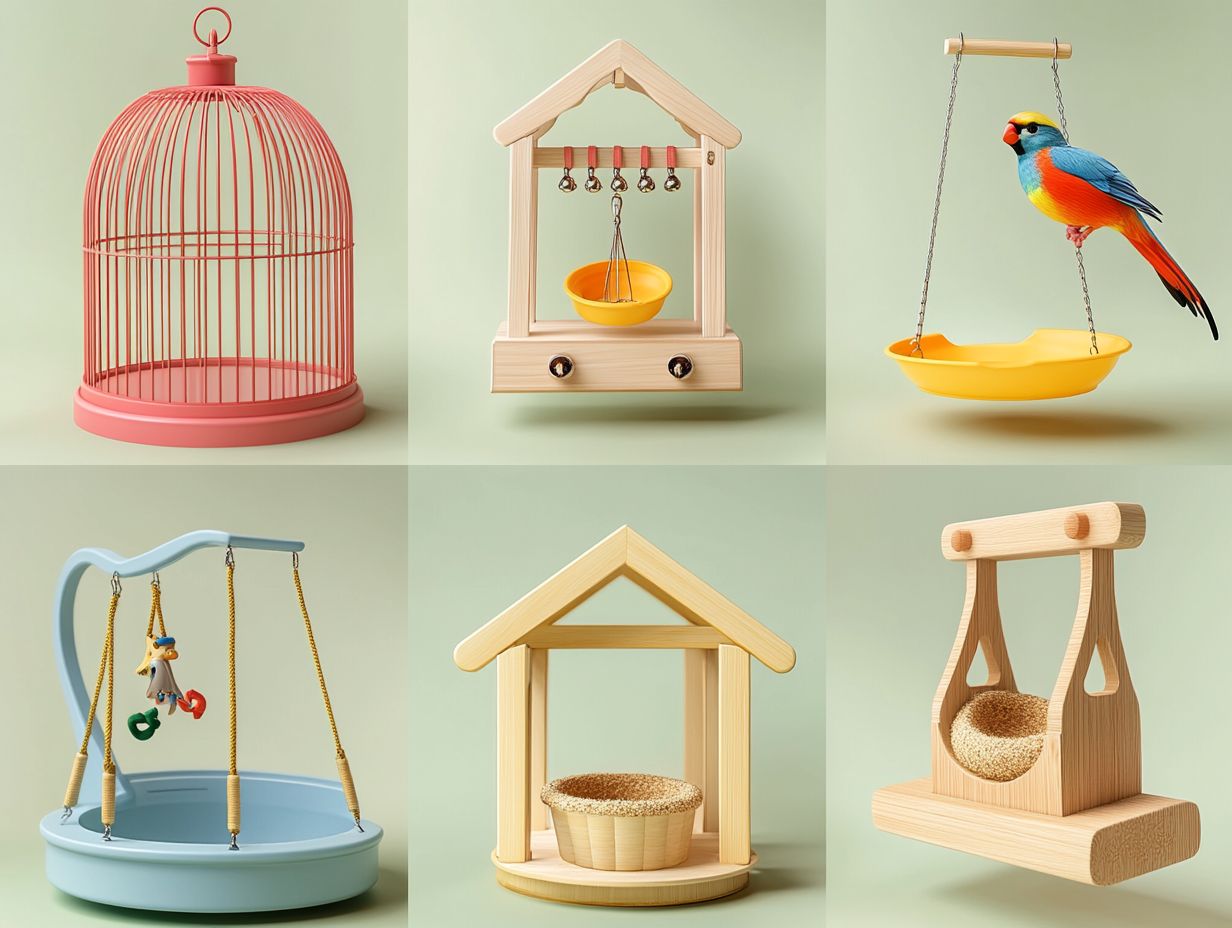
The top 6 must-have accessories for indoor birds are a spacious cage, perches, toys, food and water dishes, a bird bath, and a cover for the cage at night. To learn more about these essentials, check out the top 7 accessories every bird needs.
Why is a spacious cage important for indoor birds?
A spacious cage allows indoor birds to move around freely and exercise. This is crucial for their physical and mental well-being.
What types of perches are best for indoor birds?
The best types of perches for indoor birds are natural wooden perches of varying diameters. These mimic the branches they would perch on in the wild and help keep their feet healthy.
How often should I change out my bird’s toys?
It is recommended to change out your bird’s toys every 2-3 weeks. This keeps them entertained and prevents boredom.
Do I need to provide a bird bath for my indoor bird?
A bird bath is not essential, but it helps indoor birds stay clean and healthy. It is recommended to provide a bird bath 2-3 times a week.
Why is it important to cover the cage at night?
Covering the cage at night provides a sense of security for your bird. It also helps regulate their sleep schedule and protects them from drafts or light that may disturb their rest.

